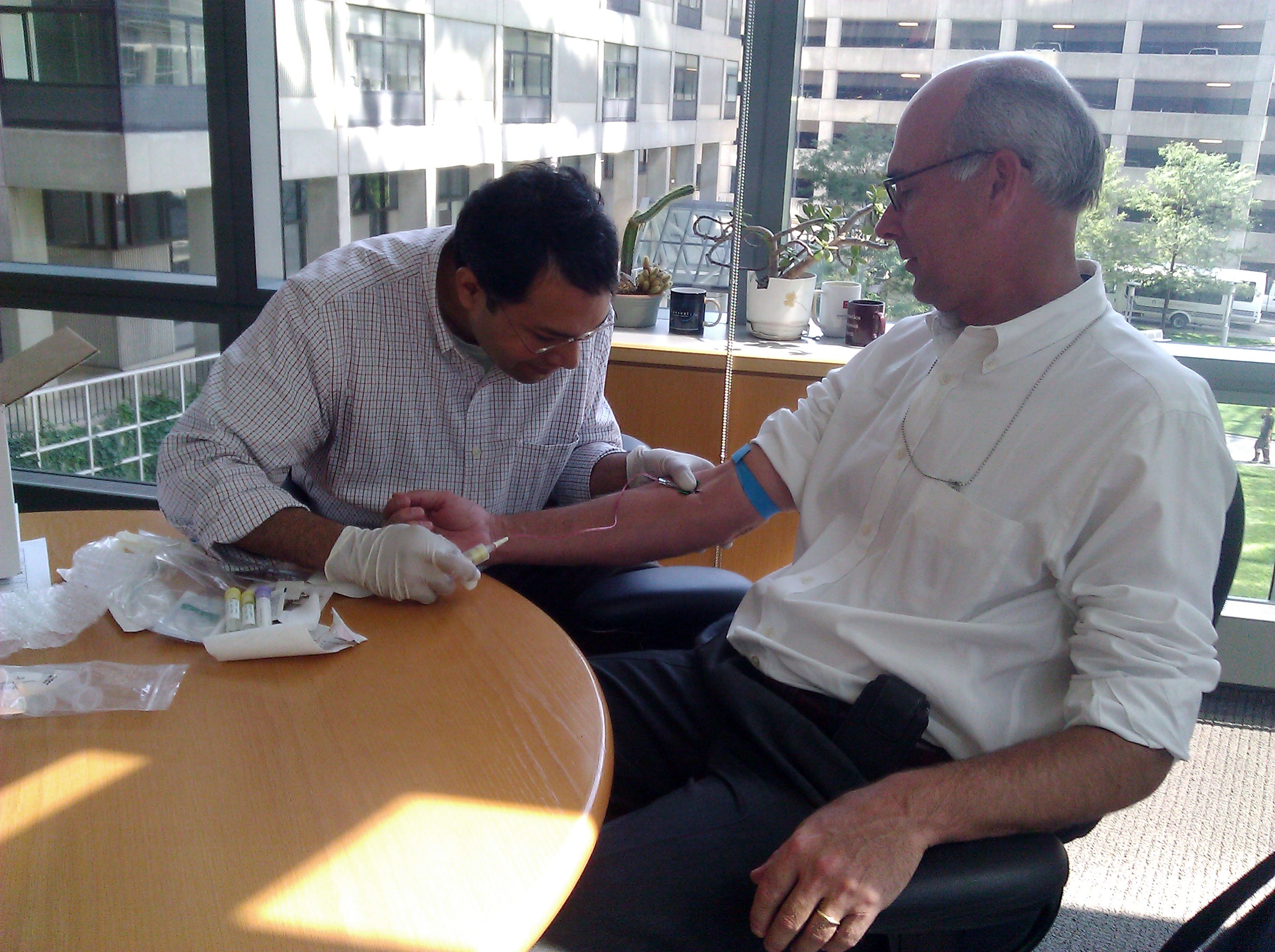[caption id="attachment_92" align="alignright" width="160" caption="Joe Thakuria draws John Lauerman's blood for whole genome sequencing. By Madeleine Price Ball, licensed under CC-BY-SA."] [/caption]
[/caption]
Madeleine Price Ball, PhD is a PGP research scientist in George Church’s lab at Harvard Medical School.
Several months ago John Lauerman, a reporter for Bloomberg News, approached the Personal Genome Project interested in having his whole genome sequenced. While we have hundreds of genomes in the sequencing pipeline, of the dozen or so genomes we have sequenced to-date, so far the results have been for the most part uneventful.
Lauerman's case was different: we found something rare and "famous", and something that nobody could have anticipated by looking through family history: a mutation that was acquired rather than inherited. This genetic variant (JAK2-V617F) is one of a number of mutations that can accumulate in blood stem cells, a precursor that could lead to several rare blood diseases.
Last night Lauerman published his experience, and we encourage all participants to read it. It confronts us with a scenario that seems likely to affect others who forge into this new and unknown territory: the very real possibility that whole genome sequencing may uncover something unexpected, ambiguous, and scary. This certainly isn’t an outcome we anticipate for most participants, but it is a rare possibility all should be aware of. Would you rather know that you carry such a variant, even if that knowledge might not help your health at all? Although some would decline, PGP participants are the sort of people who say: "Yes, I’ll take that risk, I’d rather know!" [see footnote]
His experience also illustrates potential for the Personal Genome Project to guide health care, for himself and for those who follow. The JAK2-V617F variant is so rarely seen in healthy individuals, we have very little understanding of what to expect. It has almost always been seen after a patient is diagnosed with a disease, not before. Will he develop one of these diseases? If so, which one? Perhaps many people carry the variant but never develop any symptoms of disease. In coming years Lauerman will likely continue to monitor his blood for signs of disease. It is possible that he will never develop the disease, and we hope this is the case. On the other hand, through monitoring he may detect disease sooner than he otherwise would have. By making his experiences public, his case can inform future individuals who confront the same finding.
As we move onward to sequencing hundreds and thousands of genomes, we can’t promise such interpretations will be made in a timely manner. We're working with other groups to improve our ability to interpret genomes -- and PGP participants are the perfect testbed for this development! -- but it's much harder than you might think. Genome data is made public in 30 days, but months or even years could pass before a serious and potentially scary variant is noticed. Participating in the PGP not only means that you risk learning ambiguous and scary news, but that it may be uncovered long after your data has been made public. We are always grateful to participants who choose to step into that unknown territory of genome sequencing, and who share their data so that others may learn.
Footnote: In the early stages of enrollment, individuals interested in joining the Personal Genome Project are asked to think about whether there are specific types of genetic information that they might not want to learn about themselves. Our examples include medical conditions with no effective cures or therapies, cancer, degenerative diseases, and stigmatized traits (e.g. mental illness). We do not offer the review or redacting of such information on a case-by-case basis. Only participants who wish to take the risk of learning such information are allowed to proceed with enrollment.